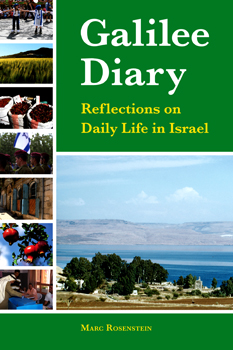
Let everyone who is zealous for the law and who stands by the covenant follow me!
– Mattathias, declaring rebellion in I Maccabees 2:27
Growing up in the Reform community in the US in the 50s and 60s, I remember the constant discussions of the Chanukah-Christmas dilemma. Was it possible to disengage Chanukah from the seasonal linkage to Christmas, and keep it somehow true to its roots? Or was it doomed to be "the Jewish answer to Christmas," which increasingly meant an orgy of shopping and materialism? Could it be kept in its proper proportions as a minor post-biblical holiday recognized mainly by lighting candles, and giving prayers of thanksgiving for both the miracle of overthrowing Seleucid rule and the miracle of the oil that lasted eight days? Or would the seasonal linkage force it to become a major festival, complete with special decorations, parties, pageants, exchange of gifts, etc? Having been away now for over 20 years, I don't know where this dilemma stands today. I guess astronomy rescued us for this year at least, by placing Chanukah on Thanksgiving, a holiday about which US Jews have no need to feel ambivalence. But I gather that this solution is temporary, and won't come around again for thousands of years. Interestingly, I remember learning about Chanukah as a celebration of religious freedom, a particularly American spin, considering that the Mattathias quoted above was anything but a pluralist.
In Israel, the holiday developed in a different direction, with the secular Zionists seizing on it as a model of a violent struggle for national self-determination. They identified with the Maccabees, and chose to see the festival as a commemoration of human heroism, rejecting any connection to divine miracles (a popular children's Chanukah song: "No miracle happened for us, we found no pitcher of oil; we quarried the rock until we bled, and there was light"). There were candle-lighting, special foods, concerts and plays and parties. Gift giving was not part of the holiday. The main gift-giving holidays are Rosh Hashanah and Pesach.
So where, culturally, does the slick Chanukah catalog for Barbie and Lego and Hello Kittie come from? There are no Christmas sales around us, no Black Friday, no Christian neighbors with whom to keep up. Is this an example of a cultural norm being shaped by capitalist forces (like Mother's Day, Father's Day, Boss's Day, Secretaries' Day, etc.)? Or maybe this is a result of globalization: Could it be that the Christmas shopping season has simply become a world-wide phenomenon that has no connection at all to belief or tradition or ideology? Or could it be that Israeli parents, not believing in miracles but also not permeated with nationalist zeal, are looking for a less fraught meaning for Chanukah that will appeal to children – and what could be a better solution than the accumulation of stuff? In other words, if we can't identify with any ideological or religious meaning of Chanukah attached to the Jewish historical experience, maybe the answer is to seek individual fulfillment – by giving and receiving gifts. Or maybe, since almost all these toys are made of plastic that is produced from petroleum, what we are seeing is a new take on the miracle of the oil; often, it seems a miracle if they last for eight days...



